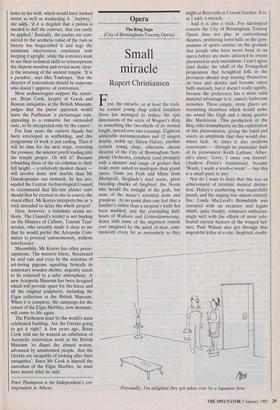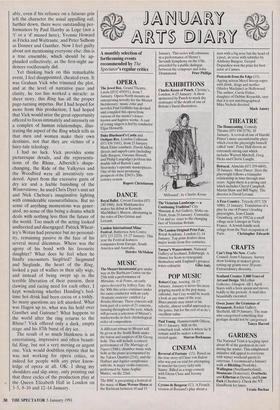Opera
The Ring Saga (City of Birmingham Touring Opera)
Small miracle
Rupert Christiansen
First, the miracle, or at least the trick. An earnest young chap called Jonathan Dove has managed to reduce the epic dimensions of the score of Wagner's Ring to something like two-thirds of its normal length, spread over two evenings. Eighteen admirable instrumentalists and 12 singers double, treble up; Simon Halsey, another earnest young chap, otherwise chorus director of the City of Birmingham Sym- phony Orchestra, conducts (and prompts) with a manner and range of gesture that looks more suited to madrigals than grand opera. Gone are Froh and Mime from Rheingold, Sieglinde's mad scene, great bleeding chunks of Siegfried, the Norns who herald the twilight of the gods, but none of the music's essential scale and grandeur. At no point does one feel that a butcher's rather than a surgeon's knife has been wielded; and the concluding half- hours of Walkiire and Gotterdiimmerung, dense with some of the mightiest sounds ever imagined by the mind of man, com- municate every bit as awesomely as they might at Bayreuth or Covent Garden. It is, as I said, a miracle.
And it is also a trick. For ideological reasons the City of Birmingham Touring Opera does not play in conventional theatres, preferring town halls or the gym- nasiums of sports centres on the grounds that people who have never been to an opera before are more attracted to events presented in such institutions. I can't agree (and dislike the whiff of the Evangelical proposition that benighted folk in the provinces should stop wasting themselves on beer and skittles and become opera buffs instead), but it doesn't really signify, because the preference has a more solid material advantage to it, namely bathroom acoustics. These empty, stony places are resonating chambers which would make me sound like Gigli and a string quartet like Mantovani. This production of the Ring rides triumphantly on the exploitation of this phenomenon, giving the band and voices an amplitude that they would else- where lack. At times it also swallows consonants — through no particular fault of its pronouncer Keith Latham, Alber- ich's curse, 'Love, I curse you forever' (Andrew Porter's translation), became `Waah, I waah u waah-e-waah' — but this is a small price to pay.
Nor do I want to deny that this was an achievement of intrinsic musical distinc- tion. Halsey's conducting was masterfully paced, and the singing was almost entirely fine. Linda MacLeod's Briinnhilde was executed with an accuracy and legato which, quite frankly, compares embarras- singly well with the efforts of more cele- brated current bearers of the winged hel- met; Paul Wilson also got through that ungrateful killer of a role, Siegfried, credit- `Personally, I'm delighted they got taken over by a Japanese firm.' ably, even if his reliance on a fatuous grin left the character the usual appalling oaf; further down, there were outstanding per- formances by Paul Harrhy as Loge (not a `e or a 'd' missed here), Yvonne Howard as Fricka and Waltraute, and Peter Sidhom as Donner and Gunther. Now I feel guilty about not mentioning everyone else: this is a true ensemble, which should be ap- plauded collectively, as the first-night au- dences vociferously did.
Yet thinking back on this remarkable event, I feel disappointed, cheated even. It was Graham Vick who trimmed the plot, and at the level of narrative pace and clarity, he too has worked a miracle: as sheer story, this Ring has all the proper page-turning impetus. But I had hoped for more from this production; I had hoped that Vick would seize the great opportunity offered to focus intimately and intensely on a complex of human relationships, illus- trating the aspect of the Ring which tells us that men and women make their own destinies, not that they are victims of a fairy-tale teleology.
I had no luck. Vick provides some picturesque details, and the representa- tions of the Rhine, Alberich's shape- changing, the Ride of the Valkyries and the Woodbird were all inventively ren- dered. Apart from the excessive gusts of dry ice and a feeble banishing of the Winterstiirme, he used Chris Dyer's unit set and Nick Chelton's imaginative lighting with considerable resourcefulness. But no sense of anything momentous was gener- ated, no sense of this being a drama which deals with nothing less than the future of the world. Too much of the acting looked undirected and disengaged: Patrick Wheat- ley's Wotan had presence but no personal- ity, remaining passive in the face of his several moral dilemmas. Where was the agony of his bond with his favourite daughter? What does he feel when he finally encounters Siegfried? Siegmund and Sieglinde, the heart of the Ring, looked a pair of wallies in their silly wigs, and instead of being swept up in the terrible liberation of their passion, their clawing and racing need for each other, I kept wondering whether Hunding's bed- time hot drink had been cocoa or a toddy. So many questions are left unasked. What was Hagen up to, what was his hold over Gunther and Gutrune? What happens to the world after the ring returns to the Rhine? Vick offered only a dark, empty stage and his 87th burst of dry ice.
The result of so much blankness is an entertaining, impressive and often beauti- ful Ring, but not a very moving or urgent one. Vick would doubtless riposte that he was not working for opera critics, or indeed for people with any prior know- ledge of opera at all. OK: I shrug my shoulders and slip away, only pointing out that three cycles of the production play at the Queen Elizabeth Hall in London on 3-5., 8-10 and 12-14 January.











































 Previous page
Previous page